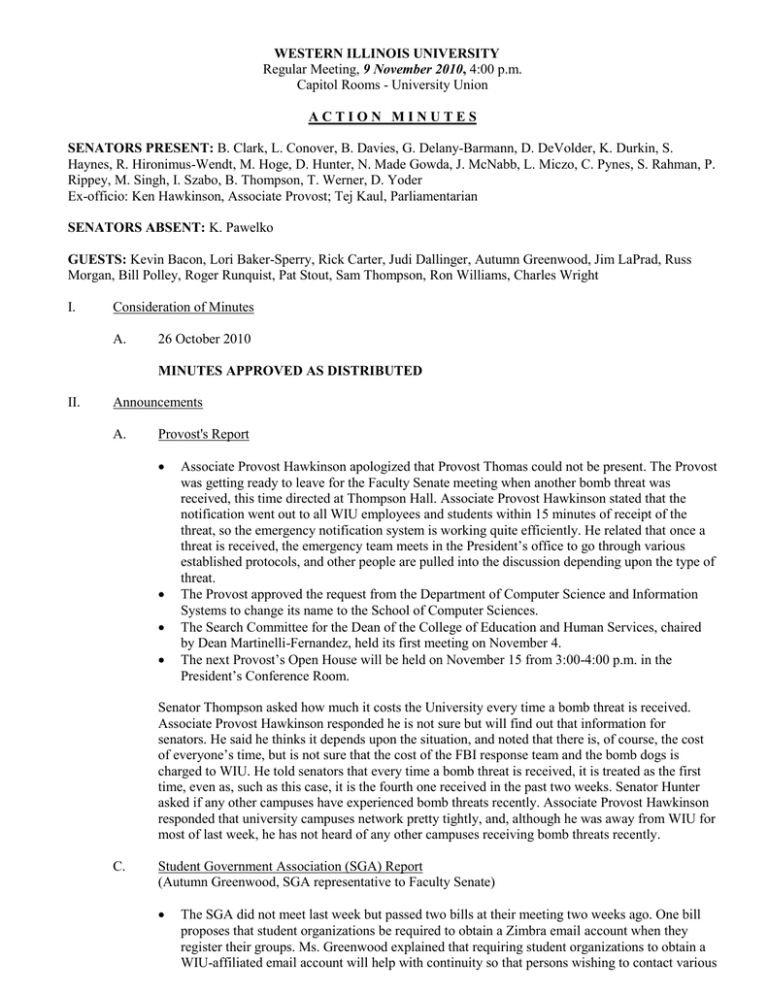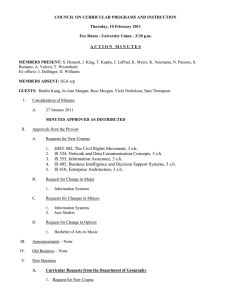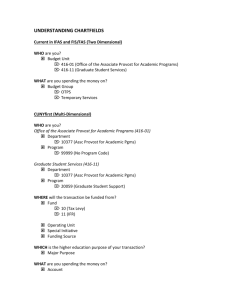WESTERN ILLINOIS UNIVERSITY SENATORS PRESENT: 9 November 2010
advertisement

WESTERN ILLINOIS UNIVERSITY Regular Meeting, 9 November 2010, 4:00 p.m. Capitol Rooms - University Union ACTION MINUTES SENATORS PRESENT: B. Clark, L. Conover, B. Davies, G. Delany-Barmann, D. DeVolder, K. Durkin, S. Haynes, R. Hironimus-Wendt, M. Hoge, D. Hunter, N. Made Gowda, J. McNabb, L. Miczo, C. Pynes, S. Rahman, P. Rippey, M. Singh, I. Szabo, B. Thompson, T. Werner, D. Yoder Ex-officio: Ken Hawkinson, Associate Provost; Tej Kaul, Parliamentarian SENATORS ABSENT: K. Pawelko GUESTS: Kevin Bacon, Lori Baker-Sperry, Rick Carter, Judi Dallinger, Autumn Greenwood, Jim LaPrad, Russ Morgan, Bill Polley, Roger Runquist, Pat Stout, Sam Thompson, Ron Williams, Charles Wright I. Consideration of Minutes A. 26 October 2010 MINUTES APPROVED AS DISTRIBUTED II. Announcements A. Provost's Report Associate Provost Hawkinson apologized that Provost Thomas could not be present. The Provost was getting ready to leave for the Faculty Senate meeting when another bomb threat was received, this time directed at Thompson Hall. Associate Provost Hawkinson stated that the notification went out to all WIU employees and students within 15 minutes of receipt of the threat, so the emergency notification system is working quite efficiently. He related that once a threat is received, the emergency team meets in the President’s office to go through various established protocols, and other people are pulled into the discussion depending upon the type of threat. The Provost approved the request from the Department of Computer Science and Information Systems to change its name to the School of Computer Sciences. The Search Committee for the Dean of the College of Education and Human Services, chaired by Dean Martinelli-Fernandez, held its first meeting on November 4. The next Provost’s Open House will be held on November 15 from 3:00-4:00 p.m. in the President’s Conference Room. Senator Thompson asked how much it costs the University every time a bomb threat is received. Associate Provost Hawkinson responded he is not sure but will find out that information for senators. He said he thinks it depends upon the situation, and noted that there is, of course, the cost of everyone’s time, but is not sure that the cost of the FBI response team and the bomb dogs is charged to WIU. He told senators that every time a bomb threat is received, it is treated as the first time, even as, such as this case, it is the fourth one received in the past two weeks. Senator Hunter asked if any other campuses have experienced bomb threats recently. Associate Provost Hawkinson responded that university campuses network pretty tightly, and, although he was away from WIU for most of last week, he has not heard of any other campuses receiving bomb threats recently. C. Student Government Association (SGA) Report (Autumn Greenwood, SGA representative to Faculty Senate) The SGA did not meet last week but passed two bills at their meeting two weeks ago. One bill proposes that student organizations be required to obtain a Zimbra email account when they register their groups. Ms. Greenwood explained that requiring student organizations to obtain a WIU-affiliated email account will help with continuity so that persons wishing to contact various D. groups do not have to try to determine the email address of the current president, for instance. She said this should go into practice in the near future. The second bill proposes that purple polo shirts be obtained for SGA members as a uniform to be worn to meetings. Other Announcements Chairperson DeVolder asked Senator McNabb to speak about CSPAN coming to WIU this week. Senator McNabb told senators that CSPAN has agreed to cover Dr. Bruce Levine’s lecture on “Abraham Lincoln as a Revolutionary Leader” at 7:00 p.m. Thursday in Morgan Hall 109. Dr. Levine comes to Western from the University of Illinois-Champaign as part of the Lincoln series that also resulted in the traveling exhibit at the Malpass Library. Senator McNabb informed senators Dr. Levin’s visit is being sponsored by the Departments of History, Philosophy and Religious Studies, African American Studies, Political Science, and the Malpass Library. Light refreshments will be provided. Senator Hironimus-Wendt announced that his FYE students have asked him to inquire whether a pep rally should be organized to honor the accomplishments of WIU’s football team before students leave for Thanksgiving break. He believes in this effort and would like to see SGA and Student Service administrators help it become a reality. Summary of the Assessment of Student Learning Annual Reports, 2009-2010 The summary report states that, “Western Illinois University has spent the past seven years reinvigorating assessment of student learning and implementing best practices. To this end, Judith Dallinger, Associate Provost, and Lori Baker-Sperry, assessment facilitator, have worked to implement goals for assessment of student learning across the university, particularly mindful of the upcoming Higher Learning Commission self-study and accreditation visit this academic year.” The report explains that “Departments identified as ‘Effective Assessment’ do an excellent job of following the four steps throughout the process, with an emphasis on direct measures and on separating out results by learning outcomes … For departments categorized as ‘No Direct Results,’ ‘No Results,’ or ‘No Report Submitted,’ you may be sure we are working to remedy this situation.” Senator McNabb asked what kinds of processes have been put in place to “remedy this situation.” Associate Provost Dallinger explained that she and Dr. Baker-Sperry have met with every department every two years and assured senators that nothing is being changed that would cause any negative damage. She and Dr. Baker-Sperry have been operating as if departments know what they should be doing better and are doing their best to meet the expectations, and the two are mostly just conducting conversations with them. She added at this point there are no consequences in place for departments, but if Faculty Senate wishes for that to change that would be great. Associate Provost Dallinger said Western has progressed a long way in terms of major and graduate assessment since Dr. Baker-Sperry became assessment facilitator in 2005. She stated while major and graduate assessment has been occurring uninterrupted at Western for the past 20 years, the Provost’s office for a number of years didn’t pay a lot of attention to assessment but is now working more closely with departments. She informed senators nearly all departments now have correct measurements in place, a program to assess General Education has been built, and the Higher Learning Commission assessment of academic projects is being completed. Associate Provost Dallinger will attend the final Higher Learning Commission meeting next week, and the HLC teams will visit WIU in February; she said assessment is one of the biggest topics the Commission considers. Associate Provost Dallinger believes WIU is in good shape for their visit but could always do better. 2 Senator Pynes inquired about the differences between “Meets Requirements Minimally” and “Effective Assessment.” He asked if the minimum requirements are not considered to be effective, noting that some departments may feel that as long as they meet the requirements minimally, they should not be prejudiced against. Associate Provost Dallinger responded that each department judged “Effective” would have reported out the results of their direct measurements for the four learning outcomes. She said those departments meeting requirements minimally may have measured some aspects but not separated the results out by learning outcomes, for instance. Dr. Baker-Sperry added that some in the “Meets Requirements Minimally” column have direct measures but weren’t able to measure very many students or had a flaw in their measurement instrument but are working to correct it. Senator Pynes noted that Biology’s assessment efforts are considered “Effective” but Biology, Zoology and Aquarium Studies only “Meets Requirements Minimally”; similar results are shown for Chemistry, which is “Effective,” and Forensic Chemistry, which “Meets Requirements Minimally,” as well as for the undergraduate (“Effective”) and graduate (“Meets Requirements Minimally”) programs in English. Associate Provost Dallinger explained that Zoology, for instance, is really a post-baccalaureate certificate program that is just getting started on assessment. She explained the set of learning outcomes for Chemistry and Forensic Chemistry were the same, and she and Dr. Baker-Sperry believe there should be separate learning outcomes for the two majors. Dr. Baker-Sperry added that she and Dr. Dallinger have met with the Chemistry Chair who is aware of the issues. Associate Provost Dallinger told senators she would be happy to discuss any of the assessment results, and recalled that some results were changed last year as a result of discussions after the report came out. She stressed the results are really for the use of the campus and individual departments. Senator Thompson asked if anything strikes Associate Provost Dallinger as encouraging or discouraging in the assessment results. She responded the results are very encouraging. Associate Provost Dallinger said she remembers coming to Faculty Senate at a time when senators asked if the University really had to even perform assessment, but now the environment is much different. She believes great progress has been made in the last five years because departments have started engaging in really good assessment from which they can obtain value, which is the top criteria for the process. She said assessment is challenging and not everyone’s favorite activity, but some departments are making it look very good. III. Reports of Committees and Councils A. Council on Curricular Programs and Instruction (Jim LaPrad, Chair) 1. Requests for New Courses a. BC 285, Broadcasting Practicum, 1 s. h. (repeatable to 4 s.h.) Senator Hironimus-Wendt asked if the course is open to all students or only Broadcasting students and how it will be graded. Dr. LaPrad responded the course is open to all students; he said CCPI discussed the similarities between this course and Broadcasting’s 300-level practicum courses. He explained the department wishes to offer BC 285 as a gateway course for those students who are exploring their interests in Broadcasting, which is why there are no prerequisites. Broadcasting advisor Pat Stout told senators he assumes the grading scale will follow the example of other hands-on 300- to 400-level Broadcasting courses where students are required to work a certain number of hours each week and complete personal assessment reports discussing the value in the work. 3 Senator Hironimus-Wendt asked if freshmen and seniors will be held to identical standards since this course is comparable to higher division practicum courses. Mr. Stout responded junior and senior students may be working at a higher level than freshmen in the class but would still be responsible for completing the requisite hours and evaluations of the work. Senator Hironimus-Wendt said he would like to see the work objectives for freshmen differentiated from those for juniors and seniors since BC 285 is a gateway course. He believes the idea that it would be assessed the same as a senior-level course is problematic. Dr. LaPrad told senators that CCPI was concerned about the lack of prerequisites for the course but the discussion at the meeting brought out that the job training and expectations were those for an entry-level broadcaster. Senator Hironimus-Wendt reiterated his concern that a senior will receive the same grade for performing freshman-level requirements. Mr. Stout explained that most freshmen have never had a Broadcasting class, but for most juniors and seniors BC 285 will be an offshoot of a different course they are simultaneously taking, such as 300-level news gathering; juniors and seniors will work the extra hours in BC 285 to earn practicum credit in order to assist them in their other classes. Senator Pynes pointed out that BC 385 and 386 students have to take Audio Production I and Video Production I as prerequisites, both of which also have prerequisites of BC 101, so junior and senior students will have considerable broadcasting experience. He thinks, within any kind of metric, it is odd that the course is not graded pass/fail. Senator Rippey pointed out that students are assigned different tasks and are evaluated as a product of their work and their level of commitment; she said while it is apparent all are assessed on their time and evaluation reports, their tasks are different depending on their level of experience. Senator Hunter asked why the department did not consider grading the course pass/fail. Mr. Stout responded he does not know; he recalled the department used to offer 300-level pass/fail courses that fulfilled the same function. He added Broadcasting reorganized its curriculum in 2007, and the paperwork for BC 285 should have been completed then. NO OBJECTIONS b. ECON 315, Economics of Sport, 3 s.h. Senator McNabb asked about communication between Economics/Decision Sciences and Kinesiology, which is mentioned in Relationship to Courses in Other Departments. Parliamentarian Kaul, who chairs Economics and Decision Sciences, responded there is a letter of support from Kinesiology; it was inadvertently omitted from the materials for Senate but will accompany the request to the Provost’s office. NO OBJECTIONS 2. Request for New Minor a. Graphic Design NO OBJECTIONS 3. Requests for New Options a. Bachelor of Arts: Graphic Design 4 Senator McNabb asked if students could currently construct their course of study to mimic the proposed options but that the purpose for creating them as options is to allow for them to be reflected on transcripts; Art Department Chair Charles Wright confirmed this is correct. NO OBJECTIONS b. Bachelor of Fine Arts: Graphic Design NO OBJECTIONS B. Council for International Education (Kevin Bacon, Chair) 1. Request for General Education Global Issues Designation a. GEOG 100, Human Geography, 3 s.h. Senator Rahman pointed out that the Justification section and course overview reference various nations that will be considered in the course but she did not observe any specific countries listed. Geography Chair Sam Thompson stated there are references to Africa, Asia and Latin America in the request. Senator Rahman said she would like more specific references in the Justification, syllabus, and other materials that come to Senate. NO OBJECTIONS C. Committee on Committees (Gloria Delany-Barmann, Chair) UNIVERSITY COUNCILS AND COMMITTEES: Search Committee for Director of Admissions Jean Wolf, Curriculum and Instruction/Special Education There were no further nominations; the nominee was elected by acclamation. Senator Delany-Barmann noted that there are still vacancies on the Council for Instructional Technology and the new Summer School Committee for faculty members from the College of Fine Arts and Communication. She plans to email department chairs reminding them of the openings. IV. Old Business – None V. New Business – None Motion: To adjourn (Rippey) The Faculty Senate adjourned at 4:32 p.m. Lynda Conover, Senate Secretary Annette Hamm, Faculty Senate Recording Secretary 5

